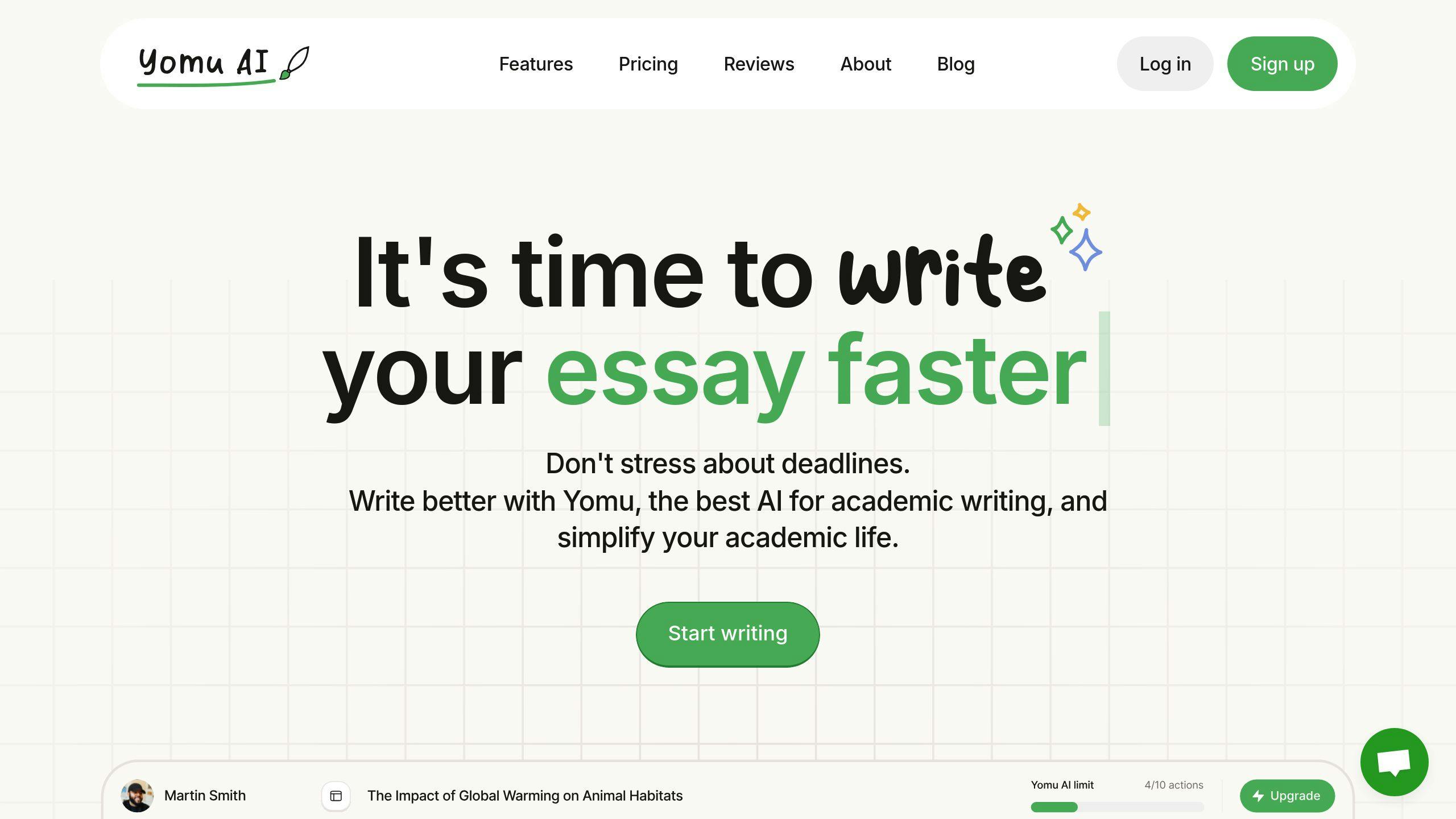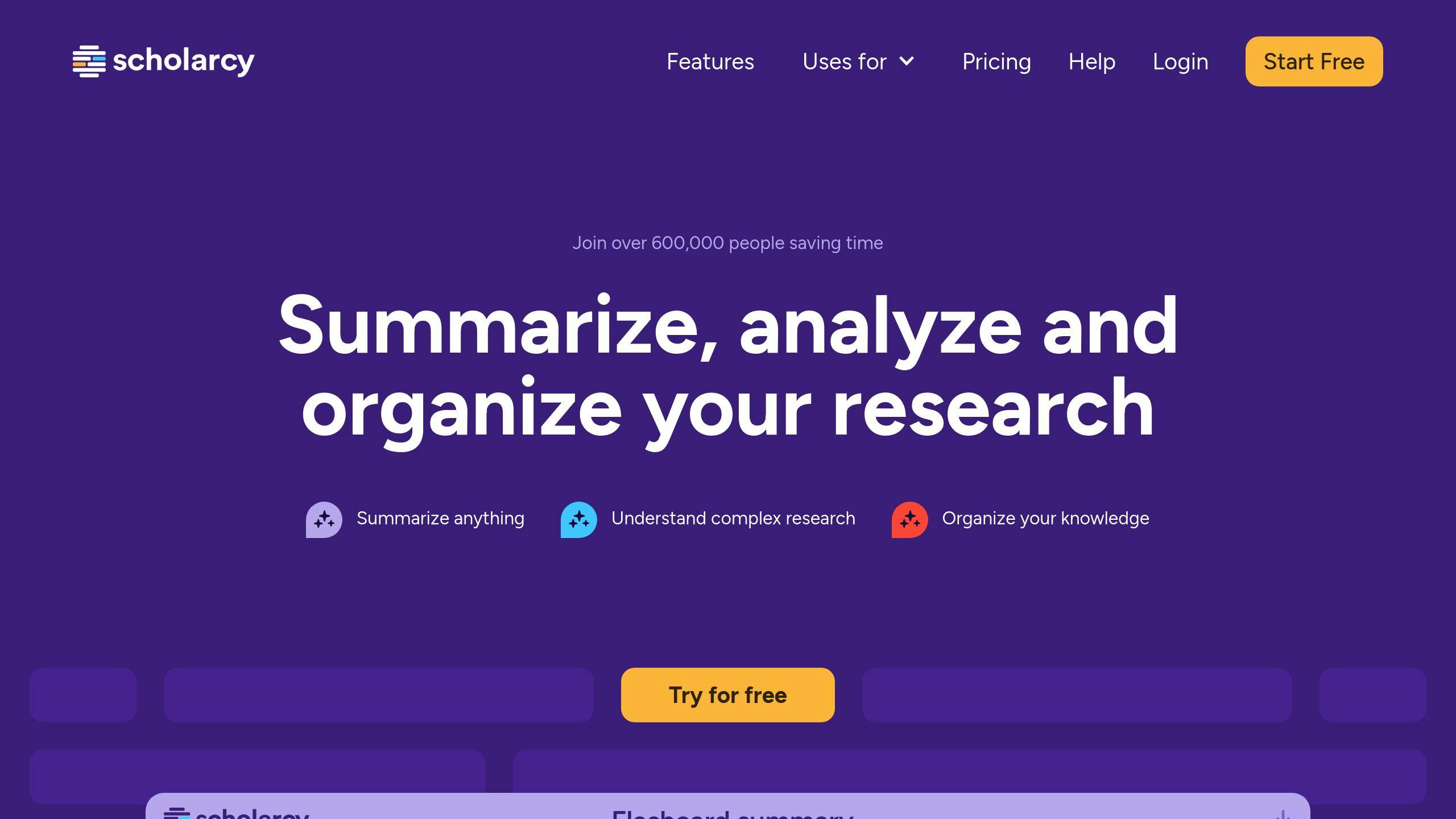
How to Write Academic Research Papers with AI Ethically
AI tools can make academic writing easier, but using them responsibly is key to maintaining integrity. Here's how to ethically integrate AI into your research process:
- Be Transparent: Always disclose which AI tools you used and how they contributed to your work.
- Preserve Originality: Ensure your ideas, arguments, and critical thinking remain your own.
- Use AI as Support, Not a Replacement: Let AI assist with tasks like grammar checks, citation formatting, and text clarity, but don't let it take over the intellectual work.
Common AI Tools for Academic Writing
- Yomu AI: Helps with writing, citations, paraphrasing, and plagiarism checks.
- Trinka AI: Focuses on grammar and language refinement for academic texts.
- Scholarcy: Summarizes research papers to save time during literature reviews.
- Scite AI: Analyzes citation context and reliability, processing over 1.2 billion citations.
Quick Tips for Responsible AI Use
- Double-check AI-generated citations for accuracy.
- Use plagiarism tools as a guide, but review flagged content manually.
- Keep your writing process transparent by documenting AI’s role in your methodology.
By following these principles, you can enhance your writing process while upholding academic standards.
Related video from YouTube
What Ethical AI Use Means in Academic Writing
Ethical AI use in academic writing means leveraging AI tools while staying true to academic principles and maintaining integrity.
AI Tools for Academic Writing: Key Features
AI tools can be incredibly helpful in academic writing, but using them responsibly requires understanding their features and limitations.
| Feature Category | Purpose | Ethical Considerations |
|---|---|---|
| Text Enhancement | Improves grammar, style, and clarity | Ensure your original ideas and voice remain intact |
| Citation Management | Formats and tracks references | Double-check for accuracy and proper attribution |
| Quality Control | Checks plagiarism and consistency | Confirm originality and compliance with academic standards |
These tools can save time and improve the quality of your work, but their use must align with ethical practices to avoid crossing any lines.
Setting Ethical Limits for AI Use
Clear ethical boundaries are critical to ensure AI tools are used appropriately in academic writing. Scite AI, which has analyzed over 1.2 billion citations, highlights the importance of proper citation and context in maintaining academic integrity [1].
Transparency and Disclosure
Be upfront about the AI tools you use and their roles in your work. Include a statement in your methodology or acknowledgments section to explain how AI contributed to your writing process.
Maintaining Original Thought
While AI can help with refining writing, the core ideas and arguments must come from you. Dr. Emir Efendić emphasizes that AI should assist, not replace, your intellectual contributions.
Quality Control Measures
Regularly review AI-assisted content to ensure it meets academic standards. This includes verifying citations, checking for accuracy, and making sure the work reflects your original research and analysis.
How to Use AI Responsibly When Writing Research Papers
Using AI for Editing and Improving Text
AI tools can help refine your writing, but they shouldn't replace your own ideas and voice. Use these tools to make your text clearer and more readable without losing your unique perspective.
- Refine, Don’t Replace: Let AI assist in improving your text’s clarity and flow while ensuring your original ideas remain intact.
- Evaluate Suggestions Carefully: AI won’t always get it right. Review its suggestions critically to ensure they align with your intent and context.
AI can also ease the burden of managing citations, making the process quicker and more efficient.
Managing and Formatting Citations with AI
When it comes to citations, AI tools can save time while still upholding academic standards. Tools like Scite AI analyze billions of citations to offer contextual insights, helping you organize references more effectively [1].
| Citation Task | AI Assistance | Manual Verification Needed |
|---|---|---|
| Format References | Automates formatting and classification | Confirm source accuracy |
| Context Analysis | Provides citation context and classification | Ensure relevance to your argument |
| Bibliography Creation | Compiles references automatically | Double-check for source accuracy |
While AI can handle the heavy lifting, it’s still crucial to manually verify the accuracy and relevance of citations.
Checking for Plagiarism with AI Tools
AI-powered plagiarism detection is a useful starting point, but human oversight is essential. Begin with an AI scan and then manually review flagged content for accuracy and context. Tools like Yomu AI can identify potential issues, but they may flag technical terms or common phrases incorrectly.
Keep detailed records of your checks to ensure transparency and maintain a clear research trail. This approach not only supports academic integrity but also helps avoid false positives.
"Scite is an incredibly clever tool. The feature that classifies papers on whether they find supporting or contrasting evidence for a particular publication saves so much time." - Emir Efendić, Ph.D., Maastricht University [1]
Dr. Efendić’s experience underscores the value of AI tools when used thoughtfully. By combining AI with your own judgment, you can streamline your work while maintaining high academic standards. The key is to use these tools as aids, not substitutes, throughout your research process.
sbb-itb-1831901
Guidelines for Ethical AI Use in Academic Writing
Using AI responsibly in academic writing means leveraging its advantages without compromising the integrity of your work. As AI tools become more common, clear guidelines help ensure they support rather than detract from research quality.
Being Open and Transparent About AI Use
Transparency is key when incorporating AI into academic work. Here are practical ways to document AI usage:
| Disclosure Element | Description | Implementation |
|---|---|---|
| Tool Documentation | Specify the AI tools used | Include details in the methodology section |
| Purpose Statement | Explain how AI was utilized | Outline its role in the research process |
| Contribution Level | Clarify AI's contribution | Acknowledge usage in relevant sections |
"Transparency about AI use builds trust and allows for proper evaluation of research methodology. It's not about permission - it's about academic honesty." - Dr. Sarah Chen, Director of Academic Integrity at Stanford University
Avoiding Dependence on AI Tools
Relying too much on AI can stifle creativity and originality. To maintain independence, establish clear boundaries:
- Set Time Limits: Allocate specific time periods for using AI tools.
- Draft Without AI: Create your initial drafts independently to ensure originality.
- Use AI Selectively: Apply AI tools only to refine and improve your arguments after the main ideas are developed.
Maintaining a balance between AI assistance and your own effort ensures that your work remains authentic and reflects your personal insights.
Balancing AI Assistance with Personal Effort
Finding the right mix of AI support and personal input is essential for upholding academic standards. Professor James Martinez from MIT's AI Ethics Lab offers this framework:
| Stage | Human Role | AI Role |
|---|---|---|
| Content Creation | Develop objectives and core arguments | Suggest resources or improve structure |
| Review Process | Ensure accuracy and originality | Assist with grammar and citation checks |
When using tools like Scholarcy or Trinka AI, critically analyze their output to ensure it aligns with your goals. For example, Scite AI's citation analysis, which processes over 1.2 billion citations, can be a helpful resource - but always verify that references are relevant and appropriately contextualized [1].
Conclusion: Using AI in Academic Writing the Right Way
Ethical guidelines are crucial as AI tools like Yomu AI and Scite AI continue to reshape academic writing. Maintaining transparency and responsible use is key to upholding the integrity of research.
Take Scite AI, for example. It offers researchers helpful citation insights, making the research process more efficient. As Emir Efendić, Ph.D., from Maastricht University, puts it:
"Scite is an incredibly clever tool. The feature that classifies papers on whether they find supporting or contrasting evidence for a particular publication saves so much time." - Emir Efendić, Ph.D., Maastricht University [1]
Using AI ethically means being clear about its role in the writing process, balancing its assistance with human effort, carefully reviewing its outputs, and openly acknowledging its contributions. These practices ensure that AI tools are integrated into academic work responsibly.
AI tools can simplify tasks like grammar checks, managing citations, and analyzing literature, all while helping researchers maintain rigorous academic standards. The focus should remain on using these tools to support and enhance human expertise - not replace it. As technology evolves, ethical practices must evolve alongside it to ensure responsible use in academic writing.
Tools to Help You Write Academic Papers with AI
Here are some tools that can make your academic writing process smoother, while ensuring originality and transparency.
Yomu AI: Writing and Citation Assistance

Yomu AI is a writing assistant packed with features like paraphrasing, text improvement, citation management, summarization, and plagiarism detection. It’s designed to support ethical academic writing practices.
Trinka AI: Grammar and Language Support

Trinka AI focuses on grammar and language refinement, offering suggestions tailored specifically for academic work. It helps researchers polish their writing style while ensuring technical precision.
Scholarcy: Summarizing Research Papers

Scholarcy breaks down research papers into key points, highlighting findings, methodologies, and conclusions [2]. It’s a time-saver for literature reviews, allowing researchers to quickly grasp and integrate relevant studies.
Scite AI: Analyzing and Contextualizing Citations
Scite AI analyzes how sources are cited in other academic works. It offers context for citations and helps validate the reliability of your references.
| Tool | Primary Function | Key Benefit |
|---|---|---|
| Yomu AI | Writing & Citation | Comprehensive writing and citation aid |
| Trinka AI | Grammar & Language | Tailored academic language refinement |
| Scholarcy | Paper Summarization | Speeds up understanding of research |
| Scite AI | Citation Analysis | Provides citation context and reliability |
